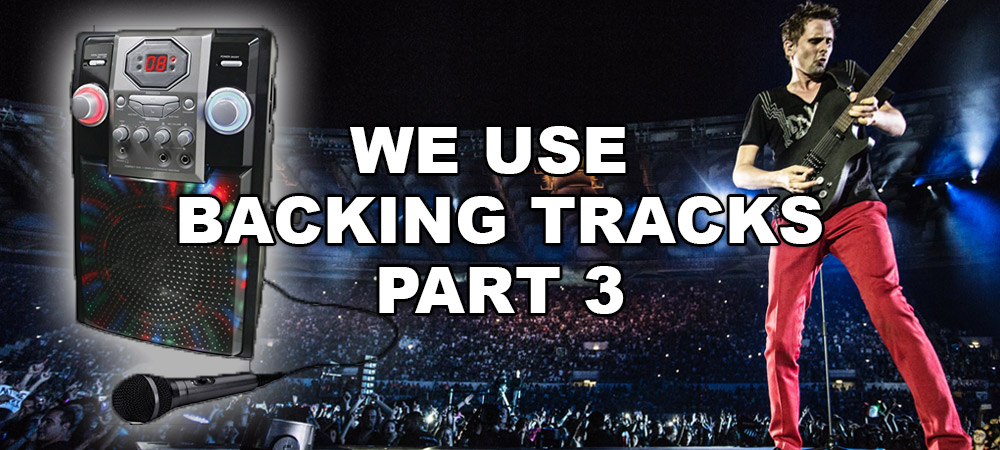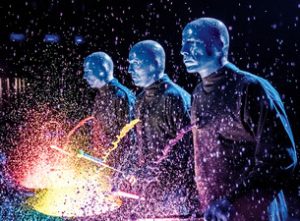We Use Backing Tracks – Part 3: Karaoke and Musical Integrity
Posted by Fun DMC on March 23rd 2018

Over the last few weeks, we dove into the history of Fun DMC’s introduction to using backing tracks and how we built our show around them by having them control lighting, instrumentation, video, and more. I ended the last part by asking some open-ended questions regarding being a band that is not only supplemented by, but relies almost entirely on, a computer to run the production. Now we’re going to unpack some of the criticisms, what the musical perception of tracks are as a whole, and what this ultimately means Fun DMC actually is.
This may ruffle some feathers.
Live Karaoke
Let’s get the big one out of the way. Most people who understand how clicks and tracks work can see us perform and separate out what is happening live and what’s coming from the computer. Without giving away too much of the secret sauce, I can tell you that what is 100% live every time is the foundation of a band – every lead vocal, every guitar solo, every bass part (when I’m there, anyway), and every drum beat. We DO NOT and WILL NOT lip sync or pantomime a single moment. It’s sometimes hard to tell since we use digital instrument amps and drums, but Robert is absolutely playing those riffs. Albert is hitting that note. Katey is singing while hula hooping. And if you watch closely, you’ll catch a missed bass note (or two), a wrong lyric, a slightly off harmony, and more occasional mistakes that every musician will make. We don’t cover these up with tracks and won’t try. We also don’t use a single bit of autotune and all of our vocal delay or reverb is controlled by Chad behind the board – not the tracks.
Girl You Know It’s True
 Now that that’s out of the way, let’s move on to some overall misconceptions. We’re obviously not the only band using backing tracks. Most people associate tracks with disgraced Grammy award winners Milli Vanilli, Ashlee Simpson’s amazing SNL appearance, or the Red Hot Chili Peppers’ appearance at the 2014 Superbowl. It’s also easy to mentally separate hearing something in concert without seeing a musician, a la electronica or rap or pop performances. If it’s just a DJ or their are no on-stage musicians, it’s obviously tracks that they’re singing (occasionally) over.
Now that that’s out of the way, let’s move on to some overall misconceptions. We’re obviously not the only band using backing tracks. Most people associate tracks with disgraced Grammy award winners Milli Vanilli, Ashlee Simpson’s amazing SNL appearance, or the Red Hot Chili Peppers’ appearance at the 2014 Superbowl. It’s also easy to mentally separate hearing something in concert without seeing a musician, a la electronica or rap or pop performances. If it’s just a DJ or their are no on-stage musicians, it’s obviously tracks that they’re singing (occasionally) over.
A good example of this is one of Robert’s favorite bands, Twenty One Pilots. When you watch their dynamic live show, there is no point where you see two people but hear bass or synth that you feel like they’re trying to trick you because those instruments aren’t on stage. They’re definitely playing the drums, doing the lead vocals, probably doing some keyboard work here and there, but they’re putting on a show first and foremost.
“Well, sure. But these are just a bunch young whippersnappers pretending that they’re musicians and doing karaoke over protools, while the real musicians such as…”
Ah, this old chestnut. No true musician, no, artist, would be caught dead using backing tracks. We hear these this criticism and more all. the. time, more often than not by very talented musicians – people who have put respectable time and effort into their craft – and feel that this method of “cheating” is beneath them and their (oftentimes generational) influences. However, the best part is when you hear those same critics clutching their pearls about how so and so country or pop band is *gasp* playing to backing tracks, and meanwhile they’re missing the part where the groups that they hold into high esteem are out on tour right now doing the exact same thing. Need some specifics? How about:
• Motley Crue
• The Police
• Pink Floyd
• U2
• The Who
• Van Halen
• The Rolling Stones
• Rush
• Coldplay
• Muse
• Aerosmith
• Queen (current lineup)
• Electric Light Orchestra
• John Mayer
• Prince
• Kiss
• Paul McCartney
• The Killers
• Metallica
• Dolly Parton
• Bob Dylan
• Dream Theater
• Neil Young
• David Bowie
• Pearl Jam
• Journey
• Weezer
• R.E.M.
• Pet Shop Boys
• Tom Petty
• Michael Jackson
Yep. Look it up. All of them currently do or at some point in their careers have used prerecorded backing tracks in their live performances. And obviously, I’ve left out every pop singer from the 90s to present, every country artist born after 1980, every worship band, and every rapper or DJ. Heck, even the original Queen didn’t perform the most bombastic parts of Bohemian Rhapsody.
Money, It’s A Gas
And when you think about it, it makes sense. Aerosmith might be selling out stadiums, but financially it makes no sense for them to hire an orchestra to tour so they can play “Dream On”. Bruce Springsteen already has one of the greatest bands around, but he doesn’t need to bring along an extra guy to hit the snare sample alongside Max Weinberg during “We Take Care of Our Own”. Motley Crue aren’t in their twenties and can’t hit the high harmonies that they used to. Muse would require a fleet of keyboardists and guys triggering samples and effects if they weren’t using tracks to recreate their songs. Coldplay would somehow be even MORE boring if it was just those four guys and no supplementary instrumentation. And if someone is paying what some of the tickets for these acts cost, they have expectations of hearing the songs they love as they know them. Sure, there’s always room for variations and jamming and all of that, but at the same time, when I go see Bruno Mars and his fantastic backing band, I still want to hear the weird vocal effect on “Locked Out Of Heaven” or the “doo doo doo’s” from Uptown Funk. It’s just a matter of practicality.
And let’s not forget the production side of it. Speaking of Muse:
There’s so much going on here. The vocals on the bridge lifted right off the album, the guitar and bass change tones multiple times without touching a single pedal, Matt Bellamy’s vocal effects are matched perfectly to the beat. And even in during other songs when he takes off and runs a half-marathon while playing a perfect killer riff, his vocals never seem to suffer (that’s not to say he’s miming – his vocals and guitar playing are other worldly – but I wouldn’t be surprised if there weren’t some support tracks helping out).
Setting aside the instrumentation part for a second, you’ve got a state of the art lighting array lighting up a quarter of a stadium, a video array the size of a football field, pyrotechnics… stuff that has to be timed to the millisecond to make look as good as this. Every beat of this show is planned out and it all HAS to be hooked together by one time code or it will be a mess. Speaking from seeing them multiple times, this band doesn’t want you to come see them play their songs for three hours – they want you to have an experience.
Wait, Are You Really About To Compare Fun DMC To Muse?
Noooooooope. Well, actually, kind of yes. I mean, obviously not at the scale they’re doing or the type of music they’re playing or the level of anything that they’re doing.

However, at the end of the day, the idea is the same – we want to provide that experience for people who see us. The difference is that while Muse is a band first and a show second, we look at it the other way around. We aspire to have more in common with organizations like Barnum & Bailey, Penn & Teller, The Blue Man Group, and the broadway show Hamilton than with a band. We don’t spend a crazy amount of time coming up with, arranging, and learning a mashup just to be different – it would be so, so much easier to just learn an 80s song or whatever is currently charting right now. We do mashups because we get to see the look of surprise and joy on people’s faces when they realize that we just threw Lady Gaga over Fortunate Son. Those people get to experience hearing those songs like they never expected. We don’t spend weeks programming lighting cues and editing videos to sync with the music because we’re nerds (we are, but that’s not the point) – we do it because we want to set a mood with each part of each song and add a visual stimulation to the audio. Those gimmicky things we’ve become known for – polaroid pictures, hula hoops, etc – were designed and workshopped out to most effectively bring people into the show and engage. That’s not to say that other bands don’t have their ways of engaging with their audiences, but we definitely have a different mindset in how we approach this.
But You ARE A Band…
I think the point I’m trying to make is that despite the fact that we get on a stage and play music, we stopped thinking of ourselves as a band awhile ago. Much of what we do is cued, scripted, choreographed, and constantly refined – more like a musical than anything. Sure, because of the nature of being in a live environment there’s a lot of room for having to change things up on the fly and we try to make every show a unique experience in some way, but the core of Fun DMC is all driven by the “script” running on the computer. And not a week goes by that we’re not workshopping a new production element that has nothing to do with songs. Again, we’re not trying to be contrary or rebellious; it’s just a different mindset with different goals. So getting back to tracks:
 Dave O’Donnell, a Grammy-nominated engineer who worked the soundboard for one of the biggest stars of the ’80s, remembers seeing R&B crooner Usher * drop his microphone during a live arena performance – but his vocals just kept on going. “His fans loved it,” O’Donnell says. “They didn’t care. They want the dancing. They want the show. Plus they knew Usher really could sing.”
Dave O’Donnell, a Grammy-nominated engineer who worked the soundboard for one of the biggest stars of the ’80s, remembers seeing R&B crooner Usher * drop his microphone during a live arena performance – but his vocals just kept on going. “His fans loved it,” O’Donnell says. “They didn’t care. They want the dancing. They want the show. Plus they knew Usher really could sing.”
That’s exactly where we’re at. And that’s kind of what sets off a lot of the musical purists I talked about earlier. Because at the end of the day, people want the show. We could have done it without the tracks and held on to our “musical credibility” or whatever, but that’s not what would deliver the best show. And just like Usher in that moment, the goal of Fun DMC is to give them that show, that experience.
And if that’s what we’re going for, I like to think we’re on the right track(s).
Next Time On “Fun DMC Gets All Defensive About Tracks”
Next Friday I’m wrapping up this series with a look into the technical side of how we’re making all of this happen. Get ready for a deep dive into gear and software and all things nerdy.
* Okay, the quote was originally said about R. Kelly, but the last thing I wanted to do in the middle of trying to be vulnerable was to have you start thinking about how R. Kelly totally peed on people.
